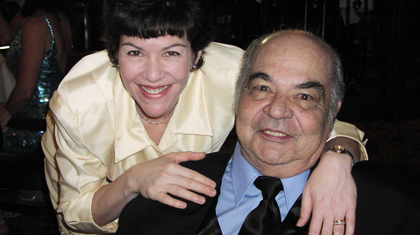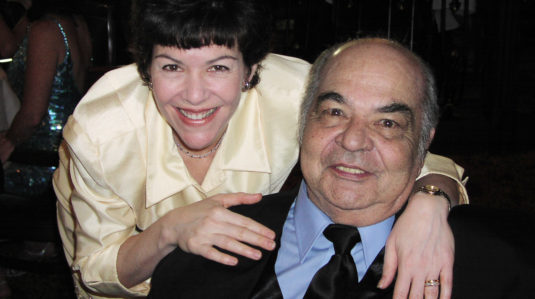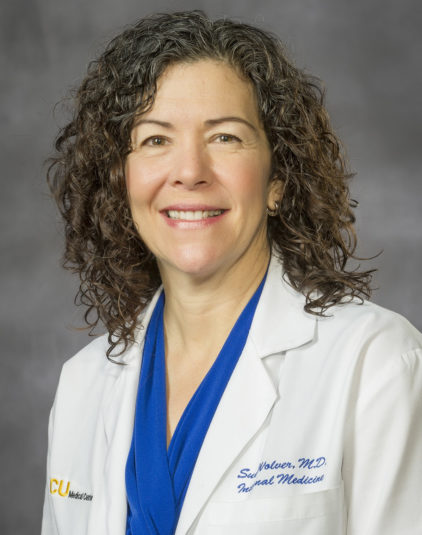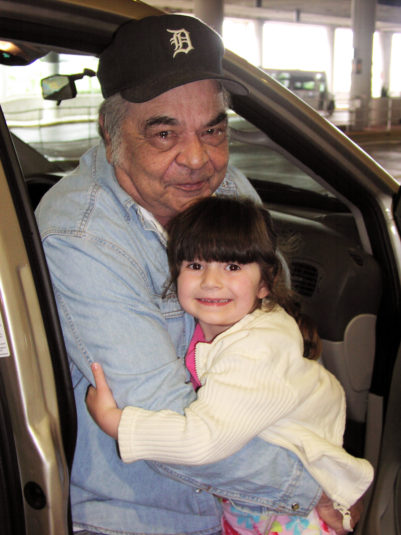

RICHMOND, VA – After losing her father to a medical error, Dr. Wolver’s support of OpenNotes got personal.
Here’s her story about bringing OpenNotes to Virginia Commonwealth University Health.
Transcript: I’m Dr. Sue Wolver. I’m a general internist. I’ve been practicing for more than 25 years. I’ve been a physician informaticist for more than 10, and as a physician informaticist, my areas of interest and expertise are in ambulatory EHR, medication reconciliation and patient engagement. I actually helped design the portal specifics. Obviously we’re using the Cerner tool, but I designed the specifics for use here and had the very first portal patient here. So, patient engagement is very, very near and dear to me and using the patient portal- I’m always about pushing the envelope, giving patients access to what has always been theirs, their medical record.
We are fortunate when we go to the Cerner conferences that we get to hear a lot of really inspirational speakers that really make you think about things, and we’d had a couple in a row that kind of had a very similar theme about having patients have access to their own data. One year we had Dr. Ross Martin. If you Google him on YouTube, he has a lot of great presentations and most of them are music, and he loves to sing a song, give me my dam data, D-A-M, data about me.
The next year we had another presentation by e-Patient Dave, Dave deBronkart, and he talked about having some shoulder pain, going to see his family doc, and he said, “Well, I think your shoulder’s okay, but you have this big mass in your lung.” And it turned out that he had metastatic kidney cancer. And he said, well, you know, I’m not going to take this lying down; I’m going to have to figure out what to do to help myself, but first I need my records. At a time when he should have been either with his family (his daughter was going to be getting married in a few months) or working on trying to figure out some kind of treatment plan or specialist or whatever, he was spending all his time trying to find his records.
 And Neal Patterson, the former CEO of Cerner who passed away last year, also talked about his wife having metastatic breast cancer. And here he is the CEO and inventor of Cerner walking around with bags of medical records from all different kinds of institutions, and even more recently having her data in lots of disparate EHRs where not one person can sit down and see the whole story. So it was really a succession of events, and when I finally heard Dave deBronkart talking about how important it was to give patients access to their data, and he was the first person who introduced this OpenNotes thing, and I thought, wow isn’t that interesting. And I sat there and I really had an epiphany at that moment. I said, “We need to give patients their notes.” We had already here, because of the portal, given them their labs, their x-rays, their pathology reports, but we never had given them their notes, and the notes really complete the story. It gives you so much more than any of the data can give you alone. It lets you know what your doctor is thinking. It helps you to remember what the plan is.
And Neal Patterson, the former CEO of Cerner who passed away last year, also talked about his wife having metastatic breast cancer. And here he is the CEO and inventor of Cerner walking around with bags of medical records from all different kinds of institutions, and even more recently having her data in lots of disparate EHRs where not one person can sit down and see the whole story. So it was really a succession of events, and when I finally heard Dave deBronkart talking about how important it was to give patients access to their data, and he was the first person who introduced this OpenNotes thing, and I thought, wow isn’t that interesting. And I sat there and I really had an epiphany at that moment. I said, “We need to give patients their notes.” We had already here, because of the portal, given them their labs, their x-rays, their pathology reports, but we never had given them their notes, and the notes really complete the story. It gives you so much more than any of the data can give you alone. It lets you know what your doctor is thinking. It helps you to remember what the plan is.
I texted my boss, my CMIO, and I said, “Hey this OpenNotes thing? We really need to do it.” And he texted me back, “Yeah, good luck with that.” Knowing that we were going to face really an up hill battle to get the providers here to say yes, it’s okay for patients to look at my notes through the portal, when of course we all know that patients can go at any time they want to health information management and pick up their records with those exact same notes, but it’s something about that immediate access that really scares doctors.
I thought while every person sitting here listening to Dave deBronkart knows that giving patients access to their data and their notes is critically important, paradigm changing, engagement changing. Everything that you want out of health care can move forward with patients being able to read their doctors’ notes. So if everybody in that room knows that, what’s the difference with my doctors back at home that I know that are going to give me an uphill battle to get this through? And I realized what the difference was. The difference was the stories.

I had that great benefit from having heard the stories from all these people and realizing what it means to have access to your medical records and what it can mean when you don’t, so I put together a nice presentation with the stories of Neal Patterson and Dave deBronkart and Ross Martin, and I went to every single meeting I could go to here, and I told those stories. But of course they don’t know who those people are, so I told them my own story.
My own story is that my father died from a medical error, that had I had access to his medical records and to his doctors’ notes and to his labs, it never would have happened. He got routine hip replacement surgery, and his white count was 10, more than 10 times what it should have been. A normal white count is less than about 12,000 and his was 70,000, and it was missed by his internist, by his orthopedic surgeon. And he had leukemia, and the leukemia actually right around that time, it’s a type of leukemia that they just had a brand new treatment for. So the leukemia actually turned out not to be non-life-threatening, but because they operated on him when he had fulminant leukemia, he ended up having a horrible bleed into the hip, getting a horrible infection, and dying a really horrible death. He never should have been operated on until everything was figured out and settled and treated.
And so I told my story, and then I asked them to think about their own stories, because I knew that people sitting there had similar stories about what they could have done had they been able to see a medical record of a family member, so people really got it and we were able to move forward. And we started slowly, we started with just outpatient provider notes. We have subsequently added discharge summaries from the hospital, and now we’re pushing the envelope for considering the mental health notes because of all of the great work that OpenNotes has done. So that is my story.
Does seeing the patient’s story reflected in the notes affect the therapeutic relationship?
Oh absolutely, OpenNotes has great research around all of this, that people take their medicines better, people remember their plan better, and people trust their doctors more. You know we really have to move away from that paternalistic view of medicine where as a physician I will decide what you’re ready to handle and when you’re ready to handle it. We don’t give patients credit enough that they can handle possibly even seeing bad information prior to us. We feel that we have to sort of wrap it and package it for the patient. And we just, it’s a different mindset, you know, people who have trained for a long time you don’t ever tell anyone bad news unless they’re in front of you, so they have to come here. So it’s a paradigm shift for sure.
The other flip side to this is having my patients have the data, have my notes, helps to keep me safe. Who better to own that information than the patient? We actually did a study here. We put on the portal a little survey and really it was just intended to help give me some information for a Scottsdale Institute presentation I did on OpenNotes, and I just couldn’t believe in like a day I had like 200 responses, and we wound out getting about 1500 responses. And doctors are always afraid that patients reading these things, it’s going to make them more worried. Actually our 1500 responses showed that it makes patients actually less worried. They find out their doctors aren’t keeping things from them. They feel more engaged in their health care. They feel more engaged when they are proxy to an older parent, even possibly from far away, that they are more participant in their care. So, I mean, it is really win, win all around.
We’ve had OpenNotes now for, it’ll be three years this summer, and for all the concern and consternation that was there prior to going live with OpenNotes, we’ve heard virtually nothing since OpenNotes went live. No providers very upset that the patients read something. No patients very upset that they read something. And I think for some people, it’s bringing some of the joy of medicine back in by increasing that partnership with patients. That’s what we love, when we have an engaged patient and they make changes in their health care because they’re engaged and transformed to do something and they read something in your note. I mean I remember like you get a patient who comes in, you say, “Oh you quit smoking!” And they say, Well, yeah you told me to.” You think, well yeah, I tell hundreds of patients to do that, but you did it, and that’s great.
Dr. Wolver will soon be practicing obesity medicine full time. In VCU’s weight loss clinic, open notes are an important tool for helping her patients lose weight and reduce or come off their diabetes medications!
Read more from Dr. Wolver.
Everybody Loses, Everybody Wins!
Why Most Patients at VCU Health Approve of the Patient Portal




You must be logged in to post a comment.